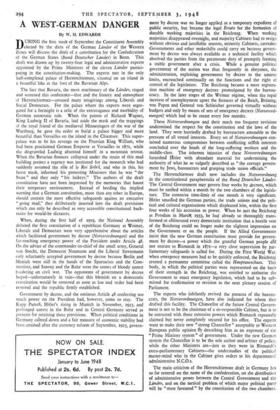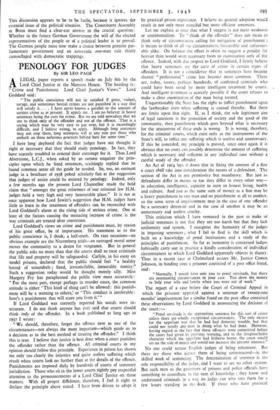A WEST-GERMAN DANGER
By W. H. EDWARDS
DURING the first week of September the Constituent Assembly elected by the diets of the German Lander of the Western Zones will discuss the draft of a constitution for the Confederation of the German States (Bund Deutscher Lander) in Bonn. This draft was drawn up by twenty-four legal and administrative experts appointed by the Prime Ministers of the eleven Lander partici- pating in the constitution-making. The experts met in the only half-completed palace of Herrenchiemsee, situated on an island in a beautiful lake at the foot of the Bavarian Alps.
The fact that Bavaria, the most reactionary of the Lander, staged and screened this conferente—that and the history and atmosphere of Herrenchiemsee—aroused many misgivings among Liberals and Social Democrats. For the palace where the experts were segre- gated for a fortnight is a relic of the extravagance and morbidity of German autocratic rule. When the patron of Richard Wagner, King Ludwig II of Bavaria, laid aside the mask and the trappings of the royal friend of the mediaeval Minnesingers of the war of the Wartburg, he gave the order to build a palace bigger and more beautiful than Versailles on the island in the Chiemsee. This super- palace was to be his revenge on the Prussian King William, who had been proclaimed German Emperor at Versailles in 1871, while the disgruntled Ludwig absented himself in a mountain retreat. When the Bavarian finances collapsed under the strain of this mad building project a regency was instituted for the monarch who had suddenly assumed the role of le Roi Soleil, and who in this, his latest mask, informed his protesting Ministers that he was "the State" and they only "his lackeys.," The authors of the draft constitution have .not been impressed by the memories that haunt their temporary environment. Instead of heeding the implied warning that a German constitution, more than any other in Europe, should contain the most effective safeguards against an executive "going mad," they deliberately inserted into the- draft provisions which can only be described as very accessible constitutional back- stairs for would-be dictators.
When, during the first half of 5919, the National Assembly debated the first constitution of a republican Germany at Weimar, Liberals and Democrats were very apprehensive about the articles which facilitated government by decree (Notverordnungen) and the far-reaching emergency power of the President under Article 48. On the advice of the commander-in-chief of the small army, General von Seeckt, the Democrat Naumann and the Liberal Stresemann only reluctantly accepted government by decree because Berlin and Munich were still in the hands of the Spartacists and the Com- munists, and Saxony and the Ruhr were the scenes of bloody unrest bordering on civil war. The opponents of government by decree hoped—unfortunately in vain—that this blemish on a democratic constitution would be removed as soon as law and order had been restored and the republic firmly established.
Government by decree, and the ominous Article 48 conferring too much power on the President had, however, come to stay. The Kapp Putsch, Hitler's rising in Munich in November, 1923, and prolonged unrest in the Ruhr and in Central Germany served as pretexts for retaining these provisions. When political conditions in Germany calmed down and a fair measure of economic stability had been attained after the currency reform of September, 1923, govern- ment by decree was no longer applied as a temporary expedient of public security, but became the legal Ersatz for the formation of durable working majorities in the Reichstag. When working majorities disappeared overnight, and majority Cabinets had to resign without obvious and justifiable reasons, minority Cabinets, caretaker Governments and other makeshifts could carry on because govern- ment by decree was always available as a technical facility which absolved the parties from the paramount duty of promptly forming a stable government after a crisis. While a genuine political government of the nation was thus frequently in abeyance, the administration, exploiting government by decree to the utmost limits, encroached continually on the functions and the right of control of the legislature. The Reichstag became a mere registra- tion machine of emergency decrees promulgated by the bureau- cracy. In the later stages of the Weimar regime, when the rapid increase of unemployment upset the finances of the Reich, Briining, von Papen and General von Schleicher governed virtually without budgets and only by means of sets of emergency decrees (Notverord- nungen) which had to be recast every few months.
These Notverordnungen and their much too frequent revisions undermined the respect for the constitution and the laws of the land. They were hurriedly drafted by bureaucrats amenable to the pressure of all vested interests. Every set of Notverordnungen con- tained numerous compromises between conflicting selfish interests concluded over the heads of the long-suffering workers and the middle-class. The inherent injustice of these Notverordnungen furnished Hitler with abundant material for undermining the authority of what he so vulgarly described as "the corrupt govern- ment by Jews, bureaucrats and grasping trade union officials."
The Herrenchiemsee draft now includes the Notverordnung in the constitutional paraphernalia of the Bund Deutscher Lander. The Central Government may govern four weeks by decrees, which must be ratified within a month by the two chambers of the legisla- ture. The extensive time-limit of one month is very significant. Hitler smashed the German parties, the trade unions and the poli- tical and cultural organisations which displeased him, within the first four weeks of his accession to power. When he met the Reichstag at Potsdam in Mardi: 1933, he had already so thoroughly trans- formed or obliterated every democratic institution that a hostile vote of the Reichstag could no longer make the slightest impression on the Government or on the people. If the Allied Governments insist that the new German constitution must provide for govern- ment by decree—a power which the grateful German people did not entrust to Bismarck in 1871—a very close supervision by par- liamentary safeguards is called for. During the First World War, when emergency measures had to be quickly enforced, the Reichstag created a permanent committee called the Hauptausschuss. This body, in which the political parties were represented on the basis of their strength in the Reichstag, was entitled to authorise the Government to enact emergency legislation, which had to be sub- mitted for confirmation- or revision to the next plenary session .of Parliament.
The experts who jubilantly revived the panacea of the bureau- crats, the Notverordnungen, have also indicated for whom they drafted this facility. The Chancellor of the future Central Govern- ment is not to be the chairman of a co-responsible Cabinet, but is to be entrusted with those extensive powers which Bismarck repeatedly claimed but never completely secured for his office. The experts want to make their new "strong Chancellor" acceptable to Western European public opinion 13'y describing him as an exponent of the "Prime Minister system" of government. Under the new German system the Chancellor is to be the sole author and arbiter of policy, while the other Ministers are—just as they were in Bismarck's extra-parliamentary Cabinets—the understudies of the political master-mind who in the Cabinet gives orders to his departmental administrative N.C.O.s.
The main criticism of the Herrenchiemsee draft in Germany has so far centred on the name of the confederation, on the distribution of administrative power between the Central Government and the 'Lender, and on the tactical Problem of which major political parry will be "most favoured" by the constitution of the two chambers.
This discussion appears to be to be futile, because it ignores the essential issue of the political situation. The Constituent Assembly at Bonn must find a clear-cut answer to the crucial question: Whether in the future German Government the will of the elected representatives of the people or of a political leader is to prevail. The German people must now make a choice between genuine par- liamentary government and an autocratic one-man rule thinly camouflaged with democratic trappings.



































 Previous page
Previous page